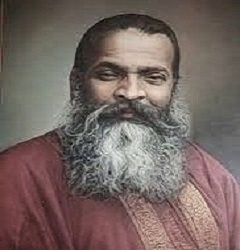
Pandit Vishnu Digambar Paluskar (1872–1931)

Pandit Vishnu Digambar Paluskar was a distinguished Indian musicologist, teacher, and composer, renowned for his pivotal role in the revival and popularization of Hindustani classical music. Born on August 18, 1872, in the town of Kherda, near Gwalior, Paluskar's deep passion for music and his commitment to its preservation and education marked a significant chapter in the history of Indian classical music.
Educated initially in traditional music under the guidance of his father and other local musicians, Paluskar later studied at the Gwalior Music School, where he honed his skills and developed a profound understanding of classical music theory and practice. His innovative approach to music education emphasized the need for structured learning and accessible instruction, which led him to establish the Gandharva Mahavidyalaya in 1901. This institution became a cornerstone for music education in India, offering systematic training in classical music and contributing to the revival of many traditional forms.
Paluskar's efforts were instrumental in preserving and popularizing a wide range of Ragas and musical compositions. He was known for his meticulous work in documenting and teaching classical music, which helped to standardize musical practices and educate a new generation of musicians and enthusiasts.
A prolific composer, Paluskar created numerous compositions that are celebrated for their melodic beauty and technical sophistication. His contributions extended beyond his own compositions and teaching; he played a crucial role in organizing music festivals and performances that brought classical music to a broader audience.
Pandit Vishnu Digambar Paluskar passed away on August 21, 1931, but his legacy endures through his significant contributions to music education and the preservation of Hindustani classical music. His pioneering work continues to inspire and influence musicians and scholars, ensuring that the rich tradition of Indian classical music remains vibrant and enduring.
